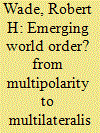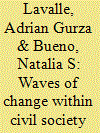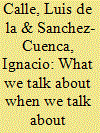|
|
|
Sort Order |
|
|
|
Items / Page
|
|
|
|
|
|
|
| Srl | Item |
| 1 |
ID:
107988


|
|
|
|
|
| Publication |
2011.
|
| Summary/Abstract |
The current financial crisis demonstrated, once again, the need for deep reforms of the international monetary and financial architecture. This article argues that reforms under way are insufficient, as they are partial in scope and rely excessively on an ad hoc body, the G20. It thus calls for an international architecture that meets two basic criteria. First, it should be comprehensive. This means that a broad range of reforms should be undertaken: better macroeconomic policy coordination; regulatory reform, including cross-border capital flows; ample countercyclical IMF and development financing with limited conditionality; global monetary reform; and the creation of an international debt court. Second, inclusive institutions should stand at the center of the new architecture, structured as a multilayered network of global, regional, and national financial institutions.
|
|
|
|
|
|
|
|
|
|
|
|
|
|
|
|
| 2 |
ID:
107991


|
|
|
|
|
| Publication |
2011.
|
| Summary/Abstract |
Many developing and transitional countries have grown faster than advanced countries in the past decade, resulting in a shift in the distribution of world income in their favor. China is now the second largest economy in the world, behind the United States and ahead of Japan. As the relative economic weight of China and several others has come to match or exceed that of the middle-ranking G7 economies, the world economy has shifted from "unipolar" toward "multipolar," less dominated by the G7. How is this change being translated into changes in authority and influence within multilateral organizations like the G20, the World Bank, and the International Monetary Fund (IMF)? Alarm bells are ringing in G7 capitals about G7 loss of influence. According to a WikiLeaks cable from the senior U.S. official for the G20 process, from January 2010, "It is remarkable how closely coordinated the BASIC group of countries [Brazil, South Africa, India, China] have become in international fora, taking turns to impede US/EU initiatives and playing the US and EU off against each other."
This essay suggests that the shift in power is much smaller than the headlines or private alarm bells suggest. The United States remains the dominant state, and the G7 states together continue to exercise primacy, but now more fearfully and defensively. China is split between asserting itself as "the wave of the future" and defending itself as too poor to take on global responsibilities (it is roughly 100th in the per capita income hierarchy). The combination of G7 defensiveness and emerging states' jealous guarding of sovereignty produces a spirit of Westphalian assertion in international fora, or "every state for itself." On the assumption that the world economy is in a transitional period, the article suggests reforms in the G20 and the World Bank that would boost their role and legitimacy as multilateral organizations in a more multipolar world.
|
|
|
|
|
|
|
|
|
|
|
|
|
|
|
|
| 3 |
ID:
107990


|
|
|
|
|
| Publication |
2011.
|
| Summary/Abstract |
Throughout the history of capitalism, there have been tensions between financial institutions and the state, and between financial capital and the firms and households engaged in the production and consumption of physical goods and services. Periods of financial sector dominance have regularly ended in spectacular panics and crashes, often resulting in the liquidation of large numbers of financial institutions and the reimposition of regulatory controls previously dismissed as outmoded and unnecessary. The aim of this article is to consider measures to restore financial markets to their proper role, as servants rather than masters of the market economy and the society within which it is embedded.
|
|
|
|
|
|
|
|
|
|
|
|
|
|
|
|
| 4 |
ID:
107992


|
|
|
|
|
| Publication |
2011.
|
| Summary/Abstract |
The escalation of violence committed by the Revolutionary Armed Forces of Colombia (FARC) guerrillas against noncombatant civilians triggered a shift in the theoretical orientation of scholars who study Colombia's political economy. While previous explanations emphasized the sociopolitical "grievances" underlying guerrilla activities, recent explanations emphasize the "greed" motive, including guerrilla involvement in Colombia's illegal narcotics trade. In this article, the author posits an alternative explanation using Charles Tilly's theories of state formation to explain FARC activities in Caquetá, Colombia. Drawing from a longitudinal data set that documents the war making, state making, extraction, and protection activities of the FARC between 1975 and 2007, in addition to historical sociological methods, the author finds that increases in FARC repression stem from the growing militarization and paramilitarization of the region, which pressured the FARC to extract resources from the local population in a way that no longer served that population's legitimate protection interests.
|
|
|
|
|
|
|
|
|
|
|
|
|
|
|
|
| 5 |
ID:
107987


|
|
|
|
|
| Publication |
2011.
|
| Summary/Abstract |
The recent financial crisis and Great Recession have been compared to other historical moments during which significant shifts in regimes of market governance have occurred. Here, we engage with the pieces that follow in this special section of Politics & Society as we consider three dimensions along which global market governance might be transformed in the direction of greater democracy. First, given that problems of market governance often extend across national boundaries, enhanced intergovernmental coordination could play a key role in promoting the public interest. Second, broader country representation would help to ensure that the interests of different national publics are more fully addressed. Third, wider social participation would expand the definition of the public interest at both the national and global levels, allowing a range of social groups to enhance the quality of their representation by governments and IGOs, and to engage more directly in the project of market governance.
|
|
|
|
|
|
|
|
|
|
|
|
|
|
|
|
| 6 |
ID:
107993


|
|
|
|
|
| Publication |
2011.
|
| Summary/Abstract |
For the past half a century, Latin American scholars have been pointing toward the emergence of new social actors as agents of social and political democratization. The first wave of actors was characterized by the emergence of novel agents-mainly, new popular movements-of social transformation. At first, the second wave, epitomized by nongovernmental organizations (NGOs), was celebrated as the upsurge of a new civil society, but later on, it was the target of harsh criticism. The literature often portrays this development in Latin American civil society as a displacement trend of actors of the first wave by the second wave-"NGOization"-and even denounces new civil society as rootless, depoliticized, and functional to retrenchment. Thus, supposedly, NGOization encumbers social change. The authors argue that NGOization diagnosis is a flawed depiction of change within civil society. Rather than NGOization related to the depoliticization and neoliberalization of civil society, in Mexico City and São Paulo, there has been modernization of organizational ecologies, changes in the functional status of civil society, and interestingly, specialization aimed at shaping public agenda. The authors argue that such specialization, instead of encumbering social change, brings about different repertoires of strategies and skills purposively developed for influencing policy and politics. Their argument relies on comparative systematic evidence. Through network analysis, they examine the organizational ecology of civil society in Mexico City and São Paulo.
|
|
|
|
|
|
|
|
|
|
|
|
|
|
|
|
| 7 |
ID:
107994


|
|
|
|
|
| Publication |
2011.
|
| Summary/Abstract |
There is no consensus in the literature about the nature of terrorism. The authors' main claim is that this is ultimately the result of the coexistence of two senses of the term, the action and the actor sense, which are not fully congruent. Rather than trying to advocate a specific conceptualization, the authors provide in this article a map of the different ways in which scholars talk about terrorism. They identify first the set of terrorist actions and the set of terrorist actors. Terrorist tactics are a variety of the power to hurt, based on the lack of military power. Terrorist groups are underground ones with no territorial control. When the two criteria meet, the core of terrorism exists: coercive violence perpetrated by underground groups. The ambiguity that surrounds terrorism is caused by two other possibilities: actors with some measure of territorial control adopting coercive tactics and underground actors adopting military tactics. Although it is not possible to remove this ambiguity in empirical research, scholars can at least identify it and analyze it. The authors illustrate the two senses of terrorism and their interaction by using the most comprehensive dataset on terrorist incidents, the Global Terrorism Database (GTD).
|
|
|
|
|
|
|
|
|
|
|
|
|
|
|
|
|
|
|
|
|